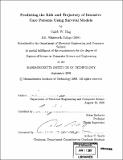Predicting the risk and trajectory of intensive care patients using survival models
Author(s)
Hug, Caleb W. (Caleb Wayne)
DownloadFull printable version (4.753Mb)
Other Contributors
Massachusetts Institute of Technology. Dept. of Electrical Engineering and Computer Science.
Advisor
Peter Szolovits.
Terms of use
Metadata
Show full item recordAbstract
Using artificial intelligence to assist physicians in patient care has received sustained interest over the past several decades. Recently, with automated systems at most bedsides, the amount of patient information collected continues to increase, providing specific impetus for intelligent systems that can interpret this information. In fact, the large set of sensors and test results, often measured repeatedly over long periods of time, make it challenging for caregivers to quickly utilize all of the data for optimal patient treatment. This research focuses on predicting the survival of ICU patients throughout their stay. Unlike traditional static mortality models, this survival prediction is explored as an indicator of patient state and trajectory. Using survival analysis techniques and machine learning, models are constructed that predict individual patient survival probabilities at fixed intervals in the future. These models seek to help physicians interpret the large amount of data available in order to provide optimal patient care. We find that the survival predictions from our models are comparable to survival predictions using the SAPS score, but are available throughout the patient's ICU course instead of only at 24 hours after admission. Additionally, we demonstrate effective prediction of patient mortality over fixed windows in the future.
Description
Thesis (S.M.)--Massachusetts Institute of Technology, Dept. of Electrical Engineering and Computer Science, 2006. Includes bibliographical references (p. 119-126).
Date issued
2006Department
Massachusetts Institute of Technology. Department of Electrical Engineering and Computer SciencePublisher
Massachusetts Institute of Technology
Keywords
Electrical Engineering and Computer Science.